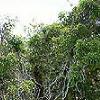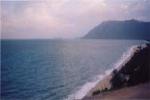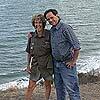Daintree National Park
Queensland
Daintree Rainforest
Despite a three-year drought (this was the third), the rainforest is still very much alive and well in Queensland. The Daintree region, located about 100 km (62 miles) northwest of Cairns, is serious rainforest, complete with saltwater crocodiles, mangroves, the works. It is one of the most ancient ecosystems on Earth and boasts more than 18,000 known plant species. Sme trees are more than 2,500 years old. However, settlement is close at hand; just on the other side of the mangroves shown below are a fence, a road, and farmland.
Views of the Daintree River
Some mangrove roots (top left) grow into the water and then back up above the surface. Mangoes (top center) are not native and are originally from India. Note the huge nest (third row center)! The sign at bottom right warns of marine stingers, which are a danger in the summer. (We were there in mid November, late spring in the Southern Hemisphere.) A supply of vinegar is kept nearby in case you get stung.
Uninvited Guests
Strangler figs (left) take root in the branches of other trees, and the roots extend downward and around the trunk of the host tree, eventually strangling and killing it. Air ferns (right) also grow in branches of other trees, and their roots do not reach the ground. Unlike strangler figs, air ferns do not damage the host plant.
Salties
Saltwater crocodiles, or "salties," are generally larger and meaner than their freshwater brethren. These are legendary "man-eaters," and they apparently still take an unwary traveler once in awhile. It is said that the crocs attack so fast, the victim has barely enough time to blurt out, "say, isn't that a...."
We came through the Daintree in mid-November, which is spring in Australia, and we saw baby crocodiles (left; can you spot any?) at a couple of points. Crocs keep growing all their lives, but until recent protections were enacted, the biggest crocs were hunted out before reaching legendary size. This female (right) is about four meters (13 feet) long, plenty big enough. But in about 20 years, monster male crocodiles twice this size could again flourish here.
Cape Tribulation
Between the Daintree River and Bloomfield River (also prime crocodile country), Cape Tribulation National Park covers a large coastal area just north of Daintree National Park, in Kuku-yalanji country. Cape Tribulation is one of the few places where the rainforest extends right to the beachs and even to the watery edge of Great Barrier Reef Marine Park, where reefs, in turn, grow almost to the shore. The lowland rainforest of Cape Tribulation has survived for 100 million years and teems with plant and animal life. A small group of us hiked down this white beach, which looked like a classic South Pacific paradise.
Mossman Gorge
The Mossman Gorge and Mossman River are part of the Daintree National Park. Larry went swimming in the river with one part of our tour group, while I hiked to a nearby bridge (built by the Australian army) with Ousha, a Dutch Antilles woman.
"Later, we went to Mossman Gorge, a beautiful rainforest gorge where we were able to swim in the river (we were upstream of all the crocs, so it was okay - I think). That was quite refreshing (though I had no swimsuit because I didn't know there was to be a swimming opportunity, so I swam in my skivvies), and I didn't want to get out." - Larry the O mlog
Top row, from left: path to the river, the swimming spot, and the view upriver. Bottom row, from left: Mossman Gorge from the bridge, Steve O, and Ousha.
Daintree River Mouth
We stopped at several nice viewpoints from which to see the mouth of the Daintree. This spot overlooks a beach from which Larry and I took the photos of the river mouth (below right and bottom).
In the "side view" of Crocodile Head island (lower R center), the "crocodile" faces the mouth of the Daintree River, which is to our right. The two views at left are taken from a different point, at the mouth of the river, looking toward Crocodile Head.
At left is our Daintree tour group. At right, Larry and Drew, our tour guide, are having a good time as the tour draws to a close.
































